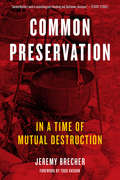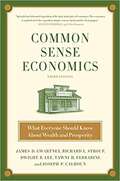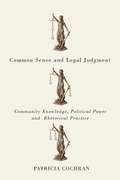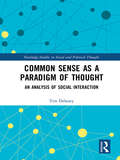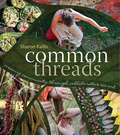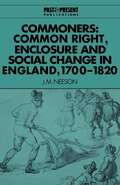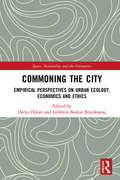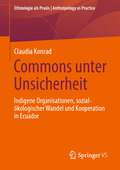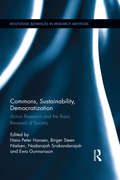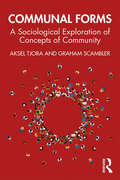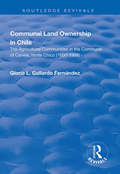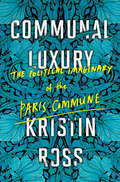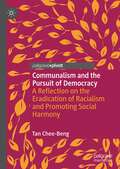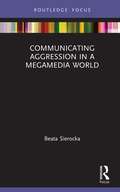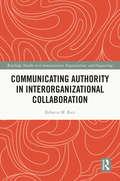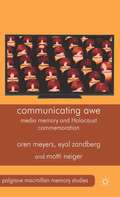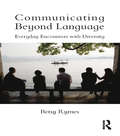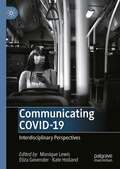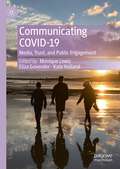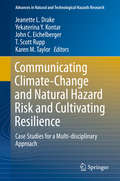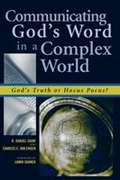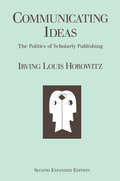- Table View
- List View
Common Preservation: In a Time of Mutual Destruction
by Jeremy BrecherAs world leaders eschew cooperation to address climate change, nuclear proliferation, economic meltdown, and other threats to our survival, more and more people experience a pervasive sense of dread and despair. Is there anything we can do? What can put us on the course from mutual destruction to common preservation? In the past, social movements have sometimes made rapid and unexpected changes that countered apparently incurable social problems. In Common Preservation, Brecher shares his experiences and what he has learned that can help ward off mutual destruction, and provides a unique heuristic—a toolkit for thinkers and activists—to understand and create new forms of common preservation.
Common Sense Economics: What Everyone Should Know About Wealth and Prosperity
by James D. GwartneyJames Gwartney, Richard L. Stroup, and Dwight R. Lee are three of the most prominent economists today, and in Common Sense Economics they show us why economic understanding is an essential ingredient for life in today's society, a key element that empowers those who possess it to better take charge of their own lives and their own responsibilities to their society. <p><p> In clear, powerful language free of any hint of jargon or obscurity, they illuminate the basic principles of supply and demand, private ownership, trade, and more. In a world where free trade, taxes, and government spending are issues everyone needs to understand, Common Sense Economics is a lucid, simple explanation of how and why our economy and our world work the way they do, and how and why individuals and nations prosper.
Common Sense and Legal Judgment: Community Knowledge, Political Power, and Rhetorical Practice
by Patricia CochranWhat does it mean when a judge in a court of law uses the phrase “common sense”? Is it a type of evidence or a mode of reasoning? In a world characterized by material and political inequalities, whose common sense should inform the law? Common Sense and Legal Judgment explores this rhetorically powerful phrase, arguing that common sense, when invoked in political and legal discourses without adequate reflection, poses a threat to the quality and legitimacy of legal judgment. Often operating in the service of conservatism, populism, or majoritarianism, common sense can harbour stereotypes, reproduce unjust power relations, and silence marginalized people. Nevertheless, drawing the works of theorists such as Thomas Reid, Antonio Gramsci, and Hannah Arendt into conversation with rulings by the Supreme Court of Canada, Patricia Cochran demonstrates that with careful attention, the democratic, egalitarian, and community-sustaining aspects of common sense can be brought to light. A call for critical self-reflection and the close scrutiny of power relationships and social contexts, this book is a direct response to social justice predicaments and their confounding relationships to law. Creative and interdisciplinary, Common Sense and Legal Judgment reinvigorates feminist and anti-poverty understandings of judgment, knowledge, justice, and accountability.
Common Sense as a Paradigm of Thought: An Analysis of Social Interaction (Routledge Studies in Social and Political Thought)
by Tim DelaneyThe notion of common sense and abiding by its implications is something that, seemingly, everyone agrees is a good way of making behavioral decisions and conducting one's daily activities. This holds true whether one is a liberal, moderate, or conservative; young or old; and regardless of one's race and ethnicity, gender, or sexual orientation. If utilizing common sense is such a good idea, why then, do so many people seem to violate it? This is just one of many significant questions surrounding the idea of common sense explored and discussed in this book. This volume presents common sense as a ‘paradigm of thought’ and as such, compares it to other major categories of thought — tradition, faith, enlightened and rational. Combining a balance of practical, everyday approaches (through the use of popular culture references and featured boxes) and academic analysis of core and conceptual methodological issues, Delaney demonstrates: The limitations of common sense and its place in everyday social interactions How we learn about common sense Why common sense is so important Common Sense as a Paradigm of Thought introduces readers to a rich variety of sociological authors and will appeal to students and researchers interested in fields such as: sociology, philosophy, social psychology, cultural studies, communications and health studies.
Common Threads
by Sharon KallisDisposing of unwanted natural materials can be expensive and time-consuming, or it can present a tremendous opportunity for creating collaborative eco-art. Invasive-species control, green-waste management, urban gardening, and traditional crafts can all be brought together to strengthen community relationships and foster responsible land stewardship. Simple, easily taught, creative techniques applied with shared purpose become the modern-day equivalent of a barn raising or a quilting bee.Common Threads is a unique guide to engaging community members in communal handwork for the greater good. Sharon Kallis provides a wealth of ideas for: Working with unwanted natural materials, with an emphasis on green waste and invasive species Visualizing projects that celebrate the human element while crafting works of art or environmental remediation Creating opportunities for individuals to connect with nature in a unique, meditative, yet community-oriented wayCombining detailed, step-by-step instructions with tips for successful process and an overview of completed projects, Common Threads is a different kind of weaving book. This inspirational guide is designed to help artists and activists foster community, build empowerment, and develop a do-it-together attitude while planning and implementing works of collaborative eco-art.Sharon Kallis is a Vancouver artist who specializes in working with unwanted natural materials. Involving community in connecting traditional hand techniques with invasive species and garden waste, she creates site-specific installations that become ecological interventions. Her recent projects include The Urban Weaver Project, Aberthau: flax=food+fibre, and working closely with fiber artists, park ecologists, First Nations basket weavers, and others.
Common Values
by Sissela BokIn this book, Sissela Bok asks what moral values, if any, might be capable of being shared across national, ethnic, religious, and other boundaries, under what circumstances, and with what qualifications. As the twentieth century draws to a close, societies confront challenges and threats - whether from environmental or military or from epidemics such as cholera or AIDS - that cross every boundary. Responses, to be effective, must be collective as well; yet they cannot begin to be effective, Bok suggests, without greater stress on common values and goals.
Commoners: Common Right, Enclosure And Social Change In England, 1700-1820 (Past And Present Publications)
by Lyndal Roper J. M. NeesonThis is a paperback edition of one of the most important and original contributions to English rural history published in the past generation. Winner of the Whitfield Prize of the Royal Historical Society in 1994, Commoners challenges the view that England had no peasantry or that it had disappeared before industrialization: rather it shows that common right and petty landholding shaped social relations in English villages, and that their loss at enclosure sharpened social antagonisms and imprinted on popular culture a pervasive sense of loss.
Commoning the City: Empirical Perspectives on Urban Ecology, Economics and Ethics
by Derya Özkan Güldem Baykal BüyüksaraçThis collection seeks to expand the limits of current debates about urban commoning practices that imply a radical will to establish collaborative and solidarity networks based on anti-capitalist principles of economics, ecology and ethics. The chapters in this volume draw on case studies in a diversity of urban contexts, ranging from Detroit, USA to Kyrenia, Cyprus – on urban gardening and land stewardship, collaborative housing experiments, alternative food networks, claims to urban leisure space, migrants’ appropriation of urban space and workers’ cooperatives/collectives. The analysis pursued by the eleven chapters opens new fields of research in front of us: the entanglements of racial capitalism with enclosures and of black geographies with the commons, the critical history of settler colonialism and indigenous commons, law as a force of enclosure and as a strategy of commoning, housing commons from the urban scale perspective, solidarity economies as labour commons, territoriality in the urban commons, the non-territoriality of mobile commons, the new materialist and post-humanist critique of the commons debate and feminist ethics of care.
Commonplace Diversity: Social Relations in a Super-Diverse Context
by Susanne WessendorfDrawing on in-depth ethnographic fieldwork, Wessendorf explores life in a super-diverse urban neighbourhood. The book presents a vivid account of the daily doings and social relations among the residents and how they pragmatically negotiate difference in their everyday lives.
Commons unter Unsicherheit: Indigene Organisationen, sozial-ökologischer Wandel und Kooperation in Ecuador (Ethnologie als Praxis | Anthropology as Practice)
by Claudia KonradDer Band zeigt, dass heterogene und robuste soziale Netzwerke zum Schutz indigener Gemeinwälder beitragen. In Ecuador wird die Bewirtschaftung von Gemeinwäldern durch einen rapiden sozial-ökologischen Wandel gefährdet. Indigene Organisationen bewältigen die veränderten Einflussfaktoren, indem sie im Kontext eines staatlichen Waldschutzprogramms mit Akteur*innen unterschiedlicher Hierarchie-Ebenen und gesellschaftlicher Sektoren kooperieren. Entlang interdisziplinärer Schnittstellen zwischen der sozial-ökologischen Anpassungsforschung, der Gemeingüterforschung und der sozialen Netzwerkanalyse liefert das Buch Beiträge zur Analyse und Theorie anpassungsfähiger Commons.
Commons, Sustainability, Democratization: Action Research and the Basic Renewal of Society (Routledge Advances in Research Methods)
by Hans Peter Hansen Birger Steen Nielsen Nadarajah Sriskandarajah Ewa GunnarssonThis book presents theoretical discussions and practical examples of Action Research from Scandinavia, Latin America and Africa, primarily dealing with how to combine nature conservation and management with local democratic community development, seeing the renewal of Commons as a way to transcend the present dichotomy between these two dimensions.
Communal Forms: A Sociological Exploration of Concepts of Community
by Aksel Tjora Graham ScamblerDrawing on a wide range of social theory, as well as empirical inputs from studies of work, neighbourhoods, events, meeting places and online self-help groups, this book suggests that communal forms are constructed on the basis of communicative, material, biographic-cultural, practice-based, and situational layers. The concept of community has long provided an important point of departure for the discipline of sociology, with the conflicting conceptions of community before and into modernity embodied in Ferdinand Tönnies’ Gemeinschaft and Gesellschaft and in Emile Dürkheim’s Mechanical and Organic Solidarity, providing the focus for debate. Other contributors have maintained an interest in communities as communions, interactional competencies, symbolic identification, tribal connection, and more recently communication. Drawing on such theoretical contributions, as well as empirical inputs, the authors develop a more nuanced concept of community, based on the notion that it is constructed from several different layers. This concept is then presented as a sociological toolbox with which to fuel approaches to examining societal challenges and change. Providing a fresh approach to a core sociological question that also has a wider societal relevance, Communal Forms will be of interest to scholars and students concerned with social issues, and for those with a more general interest in community, society and its development over time.
Communal Functions of Social Comparison
by Zlatan Križan Frederick X. GibbonsThe extent to which we see ourselves as similar or different from others in our lives plays a key role in getting along and participating in social life. This volume identifies research relevant to such communal functions of social comparisons and summarizes and organizes this research within a single, coherent conceptual framework. The volume provides an important addition to current thinking about social comparison, which has often neglected communal and affiliative functions. Whereas human desire to compare with others has traditionally been viewed as motivated by self-centered needs such as self-evaluation, self-enhancement, and self-improvement, this book presents an eclectic cross-section of research that illuminates connective, cooperative, and participatory functions of social comparisons. In this vein, the book aims both to expose research on currently neglected functions of social comparisons and to motivate a broader theoretical integration of social comparison processes.
Communal Land Ownership in Chile: The Agricultural Communities in the Commune of Canela, Norte Chico (1600-1998)
by Gloria L. Gallardo FernandezThis title was first published in 2002. While capitalism continues to convert former communal land into private property, communal ownership still exists throughout the world. By examining the agricultural communities of Chile's semi-arid Norte Chico region where the land commons are predominant, Gloria Gallardo Fernandez investigates the historical origins, emergence, socio-economic context and current development of this form of land tenure. The case study is contrasted with communal land areas in Mexico, South Africa, Switzerland and the UK, whose distinct historical and socio-politcal developments are also explored. This investigation documents almost four centuries, stemming from colonial archival sources, and thus fills the theoretical and empirical gap in the literature about this form of commons.
Communal Luxury
by Kristin RossReclaiming the legacy of the Paris Commune for the twenty-first century Kristin Ross's new work on the thought and culture of the Communard uprising of 1871 resonates with the motivations and actions of contemporary protest, which has found its most powerful expression in the reclamation of public space. Today's concerns--internationalism, education, the future of labor, the status of art, and ecological theory and practice--frame and inform her carefully researched restaging of the words and actions of individual Communards. This original analysis of an event and its centrifugal effects brings to life the workers in Paris who became revolutionaries, the significance they attributed to their struggle, and the elaboration and continuation of their thought in the encounters that transpired between the insurrection's survivors and supporters like Marx, Kropotkin, and William Morris. The Paris Commune was a laboratory of political invention, important simply and above all for, as Marx reminds us, its own 'working existence.' Communal Luxury allows readers to revisit the intricate workings of an extraordinary experiment.From the Hardcover edition.
Communalism and the Pursuit of Democracy: A Reflection on the Eradication of Racialism and Promoting Social Harmony
by Chee-Beng TanThis Palgrave Pivot examines why racialism is so persistent and the challenges it poses to the functioning of democracy and the attainment of national integration. It introduces an evolutionary psychology framework, which explains human innate potential to identify with and defend one’s group, but argues that racial dislike and conflicts are provoked by racial ideologies and the politics of ethnicity. By comparing the politics of race in a number of countries, including Malaysia and the United States, this book argues that attachment to one’s ethnic and religious identities does not hinder ethnic harmony. It is necessary to manage the issues of race and religion as well as promoting conviviality and cosmopolitanism for pursuing the ideal of common humanity and for maintaining a stable and meaningful democracy. This book concludes that democracy, as practiced, has some major weaknesses; as an ideal, it is still the best form of government to pursue.
Communicating Aggression in a Megamedia World (Routledge Focus on Communication Studies)
by Beata SierockaThis book describes how, in the era of megamedia culture, aggression in communication constitutes a threat to the communication community. Based on the theoretical incorporation of transcendental pragmatics, the book explores how conceptualizing the phenomena of megamedia aggression from this perspective and diagnosing their destructive force are essential for: postulating the need for constructing a theory of media communication closely related to the model of discursive rationality, giving this theory a critical and normative character, and embedding it in the perspective of the project of social co-responsibility and in the plan for an ethics of co-responsibility. Combining key elements of media theory, the philosophy of communication, the concept of normative ethics and the fields of social psychology and social anthropology, this book will be of great interest to scholars and students in the areas of communication studies, philosophy, anthropology, psychology and psychoanalysis.
Communicating Authority in Interorganizational Collaboration (Routledge Studies in Communication, Organization, and Organizing)
by Rebecca M. RiceThe book offers an in-depth analysis of the challenges of establishing authority within collaborative efforts. It introduces the concept of cumulative authority, arguing that communicating authority effectively is key to the creation and success of collaborations. Rice uses a communication-as-constitutive of organizations perspective to reconsider organizational authority, typically thought of in terms of leadership, as instead negotiated in communication among collaboration members as they attempt to influence the collaboration’s direction. Drawing from an extensive two-year case study of emergency management collaborations, the book traces potential influences on collaborative authority, including members’ knowledge and expertise, organizational structures and hierarchies, and the material world, including documents, technologies, and the natural environment. This book is a valuable empirical resource for organizational communication and management students and scholars. It will also appeal to community collaborators and organizers, and contains advice and reflection questions for practitioners.
Communicating Awe: Media Memory And Holocaust Commemoration (Palgrave Macmillan Memory Studies)
by Motti Neiger Oren Meyers Eyal ZandbergOffering a cross-media exploration of Israeli media on Holocaust Remembrance Day, one of Israel's most sacred national rituals, over the past six decades, this fascinating book investigates the way in which variables such as medium, structure of ownership, genre and targeted audiences shape the collective recollection of traumatic memories.
Communicating Beyond Language: Everyday Encounters with Diversity
by Betsy RymesThis new book offers a timely and lively appraisal of the concept of communicative repertoires, resources we use to express who we are when in dialogue with others. Each chapter describes and illustrates the communicative resources humans deploy daily, but rarely think about – not only the multiple languages we use, but how we dress or gesture, how we greet each other or tell stories, the nicknames we coin, and the mass media references we make – and how these resources combine in infinitely varied performances of identity. Rymes also discusses how our repertoires shift and grow over the course of a lifetime, as well how a repertoire perspective can lead to a rethinking of cultural diversity and human interaction, from categorizing people’s differences to understanding how our repertoires can expand and overlap with other, thereby helping us to find common ground and communicate in increasingly multicultural schools, workplaces, markets, and social spheres. Rymes affirms the importance of the communicative repertoires concept with highly engaging discussions and contemporary examples from mass media, popular culture, and everyday life. The result is a fresh and exciting work that will resonate with students and scholars in sociolinguistics, intercultural communication, applied linguistics, and education.
Communicating COVID-19: Interdisciplinary Perspectives
by Kate Holland Monique Lewis Eliza GovenderThis book explores communication during the first year of the COVID-19 pandemic. Featuring the work of leading communication scholars from around the world, it offers insights and analyses into how individuals, organisations, communities, and nations have grappled with understanding and responding to the pandemic that has rocked the world. The book examines the role of journalists and news media in constructing meanings about the pandemic, with chapters focusing on public interest journalism, health workers and imagined audiences in COVID-19 news. It considers public health responses in different countries, with chapters examining community-driven approaches, communication strategies of governments and political leaders, public health advocacy, and pandemic inequalities. The role of digital media and technology is also unravelled, including social media sharing of misinformation and memetic humour, crowdsourcing initiatives, the use of data in modelling, tracking and tracing, and strategies for managing uncertainties created in a pandemic.
Communicating COVID-19: Media, Trust, and Public Engagement
by Kate Holland Monique Lewis Eliza GovenderThis edited collection, follows on from 'Communicating COVID-19: Interdisciplinary Perspectives' (2021) and brings together different scholars from around the world to explore and critique the ongoing advances of communicating COVID, two years into the pandemic. Pandemic life has become familiar to us, with all its disruptions and uncertainties. In the second year of COVID, many societies emerged well attuned to new waves of infections, while others, having initially demonstrated 'gold standard' responses, regressed, either through a premature end to public health restrictions or challenges around vaccine rollouts. In many countries, bitter social divisions have arisen over mask-wearing, lockdowns, quarantine and vaccination. To better understand the ever evolving communicative landscape of COVID-19, this collection shares updated perspectives from the disciplines of media and communication, journalism, public health and primary care, sociology, and political and behavioural science, addressing the major issues that have confronted communicators, including vaccine hesitancy, misinformation, and the mobilisation of community driven communication responses as restrictions eased in various parts of the world.
Communicating Climate-Change and Natural Hazard Risk and Cultivating Resilience: Case Studies for a Multi-disciplinary Approach (Advances in Natural and Technological Hazards Research #45)
by Jeanette L. Drake Yekaterina Y. Kontar John C. Eichelberger T. Scott Rupp Karen M. TaylorThis edited volume emphasizes risk and crisis communication principles and practices within the up-to the minute context of new technologies, a new focus on resiliency, and global environmental change. It includes contributions from experts from around the globe whose research, advocacy, teaching, work, or service in the natural or social sciences deals with risk communication and/or management surrounding natural and technological disasters, with a particular focus on climate change-related phenomena. Resilience and good communication are intimately linked and with climate change precipitating more numerous and onerous weather-related catastrophes, a conversation on resilience is timely and necessary. The goal is robust communities that are able to withstand the shock of disaster. Communicating well under ordinary circumstances is challenging; communicating during a crisis is extraordinarily difficult. This book is dedicated to all those who have directly or indirectly suffered the effects of climate change end extreme events with the hope that the advance of knowledge, implementation of sound science and appropriate policies and use of effective communication will help in reducing their vulnerability while also improving resilience in the face of often devastating natural and technological disasters.
Communicating God's Word In A Complex World: God's Truth Or Hocus Pocus?
by Charles E. Van Engen Lamin Sanneh R. ShawCommunicating God's Word in a Complex World reaches out to the growing number of missionaries, pastors, Bible translators and teachers, mission and theological educators and students dealing with communicating the gospel. This is increasingly difficult in today's pluralist and global contexts. What was God's message, and how has spreading that message changed through the generations? The answer to that question requires a hermeneutical process that seeks to understand the biblical text and the context in which it was originally presented. R. Daniel Shaw and Charles Van Engen say that contemporary proclaimers of God's word can model their approach after that of the writers of scripture, who reinterpreted and restated their received texts for their audiences. Thus, Gospel communication is impacted by the way humans know God. This, in turn, is informed by contexts. Communicating God's Word in a Complex World draws lessons from the biblical authors themselves as a guide for how best to present God's message.
Communicating Ideas: The Politics of Scholarly Publishing
by Irving Louis HorowitzCommunicating Ideas is the first attempt to place publishing in America in its political and commercial setting. The book addresses the political implications of scholarly communication in the era of the new computerized technology. Horowitz does so by examining classic problems of political theory in the context of property rights versus the presumed right to know, and the special strains involved in publishing as a business versus information as a public trust Offering a knowledgeable and insightful view of publishing in America and abroad, this book makes an important contribution to the study of mass culture in advanced societies.The discussion ranges considerably beyond scholarly publications into communication as a whole, encompassing a wide range of issues from cable and satelite television control to specialized issues in copyright legislation, the prize system in publishing, and the definition of standards of the industry. This new edition, expanded by fully one third, expands on such themes, and in addition deals with Horowitz's new research on the history of social science publishing.The first edition, published in 1986, was described by WE. Coleman as "a marvelous book which indeed offers a realistic analysis of publishing." John P. Dessauer declared that "no one thinking seriously about the future of scholarly communication can afford to ignore his work, in particular his treatment of basic issues." Joseph Gusfield (Los Angeles Times), in his review, noted that "Horowitz is alive to the possibilities and barriers for academics to reach a wider audience and for lay persons to utilize scholarship. Both groups can learn much from this intelligent book." And Philip G. Altbach (Scholarly Publishing) concluded his review by saying that Communicating Ideas "will be of interest not only to publishers and editors, but also to librarians and to sociologists of science."
